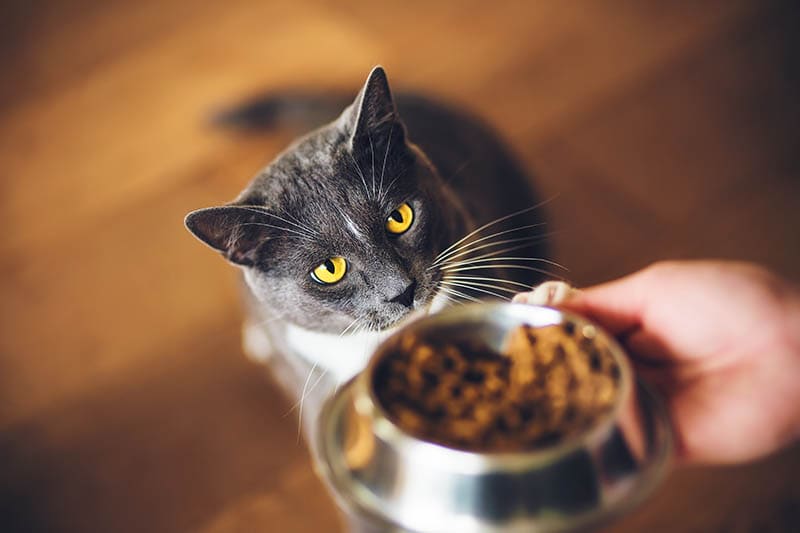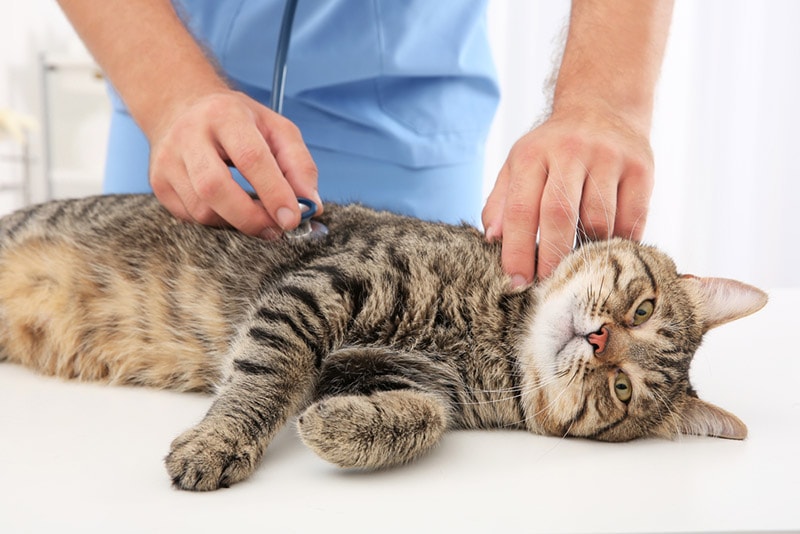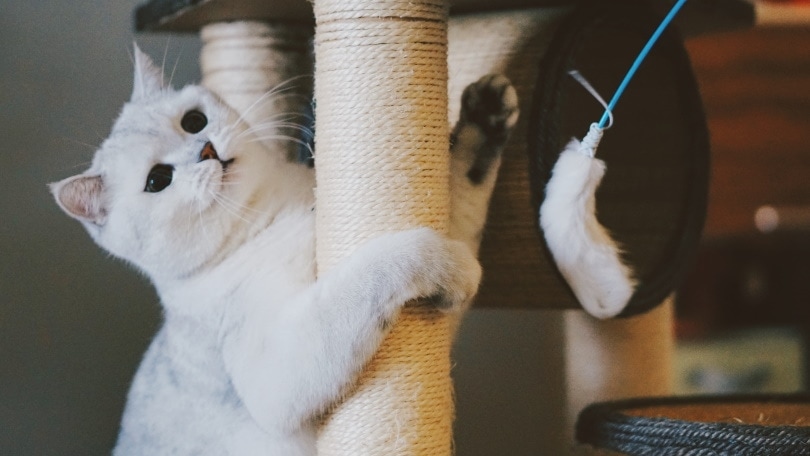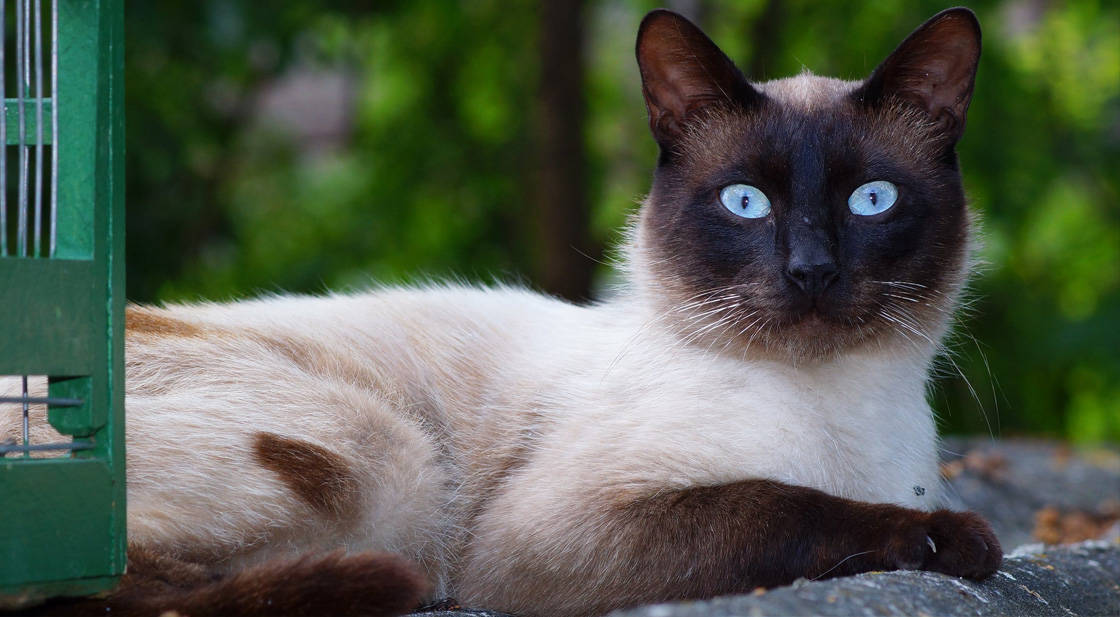How To Tell If Cat Is Allergic to Food – Vet Approved Advice
By Lorre Luther
Updated on

Cats love food, but sometimes their favorite meals don’t agree with them. Food allergies are difficult to spot, diagnose, and treat, as they often cause vague signs that can be difficult to identify. Feline allergies to specific foods are relatively rare; food intolerances are far more common.
However, food sensitivities and allergies often have similar signs, specifically stomach trouble, such as diarrhea and vomiting. Cats as young as 3 months old can develop food allergies, and some cats develop allergies to products they were once able to eat without problems. Keep reading for more on determining if your cat is allergic to their food, followed by a step-by-step guide on what to do next.
Preliminaries
Below we’ll cover a few important basics about food allergies, including signs and causes.
What Is the Difference Between Food Intolerances, Sensitivities, and Allergies?
- Intolerances are caused when the body lacks a certain enzyme to break down or properly digest a certain ingredient or food item. For example, many cats are lactose intolerant and don’t handle dairy well.
- Sensitivities are triggered by the digestive system whenever it encounters certain ingredients that it can no longer properly digest. Sensitivities are often an exaggerated response, and though triggered by the digestive system, they can trigger signs in other body systems. In cats, these signs are often triggered in the skin. Therefore, these sensitivities are sometimes called Cutaneous Adverse Food Reactions (CAFRs).
- Allergies are triggered by the immune system, and the signs of an allergic reaction are much more serious than those of a sensitivity or intolerance.
What Are Some Common Signs of Food Allergies?
- Recurrent ear infections
- Recurrent gastrointestinal difficulties, vomiting, diarrhea, constipation, bloat, or flatulence.
- Skin issues: itchiness, dryness, skin flaking, red skin, dandruff, or hives.
- Abnormal hair loss (alopecia) around the body, sometimes in a symmetrical fashion
What Causes Feline Food Allergies?
- Cats cannot develop allergies to a protein or ingredient they haven’t consumed before.
- There may be a genetic predisposition to food allergies in cats
- Food allergies are often present in cats that are either under a year old or over 5 years old.
- Cats can develop allergies to proteins or ingredients they previously had no issues with.
Some cats have allergies to dairy products, but others are simply lactose intolerant. Cats can develop food allergies to foods they previously had no trouble consuming.

Are There Other Conditions That Resemble Food Allergies?
- Environmental allergens
- Parasites of the skin, such as fleas, mites, or ticks.
- Bacterial or Fungal Infections
- An underlying health issue that causes skin issues (for example, an endocrine issue).
- Issues of the skin itself (for example, skin dryness in cold weather)
What To Do If You Suspect Your Cat Is Allergic to Food
Below, we’ve included a step-by-step guide to help you determine which steps to take if you’re concerned your cat may suffer from food allergies. Diagnosing food allergies in cats requires time and patience. It’s usually best done under veterinary guidance.
1. Track Your Pet’s Health
If you think your cat may have a food allergy, pay attention to when they appear sick. Write down what they eat and the signs you see afterward, including how long problems take to appear.
Pay particular attention to itchy skin and ear infections since they may indicate an allergy. It’s also best to keep track of any changes in your pet’s general health, including if they’ve suddenly become lethargic or are exhibiting behavioral changes. After making your observations and reviewing your notes, make an appointment to speak with your veterinarian about your concerns.
2. Work With Your Veterinarian to Identify Triggers

Identifying food allergies is often a lengthy process of trial and error involving eliminating potential triggers from your pet’s diet to see if their allergy signs improve, followed by the controlled reintroduction of individual proteins to identify which products are causing the problems.
Prior to performing such a trial, your vet will ensure that your cat is in good health and has no other underlying health issues. For this process, in addition to a thorough physical exam, your vet may also recommend other diagnostic tests such as blood work, radiographs, an ultrasound, a fecal test, and a urine test.
Certain allergens (particularly environmental allergens) can be identified without a food elimination trial. They can either be identified by blood tests, or by an intradermal test, where specific potential allergens are carefully introduced into your pet’s skin in a very small area to ascertain if your cat’s skin has a reaction to them.
A food elimination trial process takes at least 8 weeks from start to finish. In many cases, it lasts longer. Therefore, the success of a such trial relies heavily on your commitment towards the process. Cats have to follow limited-ingredient or specially formulated hypoallergenic diets while trying to identify food allergies. If staying on such a diet for a period of about 6-8 weeks gradually resolves your cat’s signs, then it might be possible that your cat has a food allergy to a certain ingredient.
To confirm an allergy, your cat will be reintroduced to the food items or ingredients they ate regularly prior to their trial one by one to see which food item (if any) triggers their issues. If a particular ingredient or food successfully triggers the reaction once re-introduced to your cat’s diet, then it is labeled as an allergen. Conversely, if an ingredient doesn’t cause a reaction, it means your cat was not allergic to that particular ingredient.
Treats, human food, and every type of kibble or wet food not included in the trial are entirely off-limits during the testing period. It is very important to note that this trial isn’t a diet, and your cat doesn’t have any “cheat days” where you can feed them their once beloved treats or snacks. Ensure everyone in your household understands this while your cat is on such a trial.
3. Remove the Trigger
Avoidance is usually the best way to deal with food allergies. Cats with food allergies often do just fine if they’re not eating products containing the triggering ingredient. Once the allergen has been identified, it’s often easy to find high-quality products that don’t include that particular ingredient.
Food allergies can’t be cured and generally don’t just get better over time, so cats with these immune reactions usually need to stick to limited diets for the rest of their lives to prevent flare-ups.
4. Monitor Your Cat
Because cats can develop allergies to the ingredients they were previously able to eat, it’s critical to monitor your buddy so you can quickly intervene if problems start to develop with new foods. Some single-protein commercial foods are processed or packaged in factories that handle products with several proteins, which can lead to cross-contamination.
Reach out to your veterinarian for help before selecting a new food for your cat to minimize exposure to potentially stressful mealtime changes. Remember that cats often dislike and resist food changes, and new brands are notorious for causing upset stomachs in cats. Although it may be tempting to quickly start a trial diet for your cat, patience is an absolute necessity, and dietary changes for cats should always be slow and gradual.
Conclusion
Food allergies in cats can be challenging to diagnose, but not entirely impossible. If you suspect that your cat has such an allergy, it is best to schedule an appointment with your veterinarian. Your veterinarian will ascertain the likelihood of a food allergy by ruling out other potential causes for your cat’s issues before choosing an appropriate plan for you and your cat.
A food elimination trial might be advised for your cat. Though it may be seem lengthy and cumbersome, it is indeed worth it, as dedication with the process can result in a happy, allergy-free feline. Your dedication to the trial will likely yield many happy years of allergy-free companionship from your beloved feline fur baby.
- You Might Also Be Interested In: How Cats Endocrine Systems Work – Vet-Reviewed Facts
Featured Image Credit: Valeri Vatel, Shutterstock












